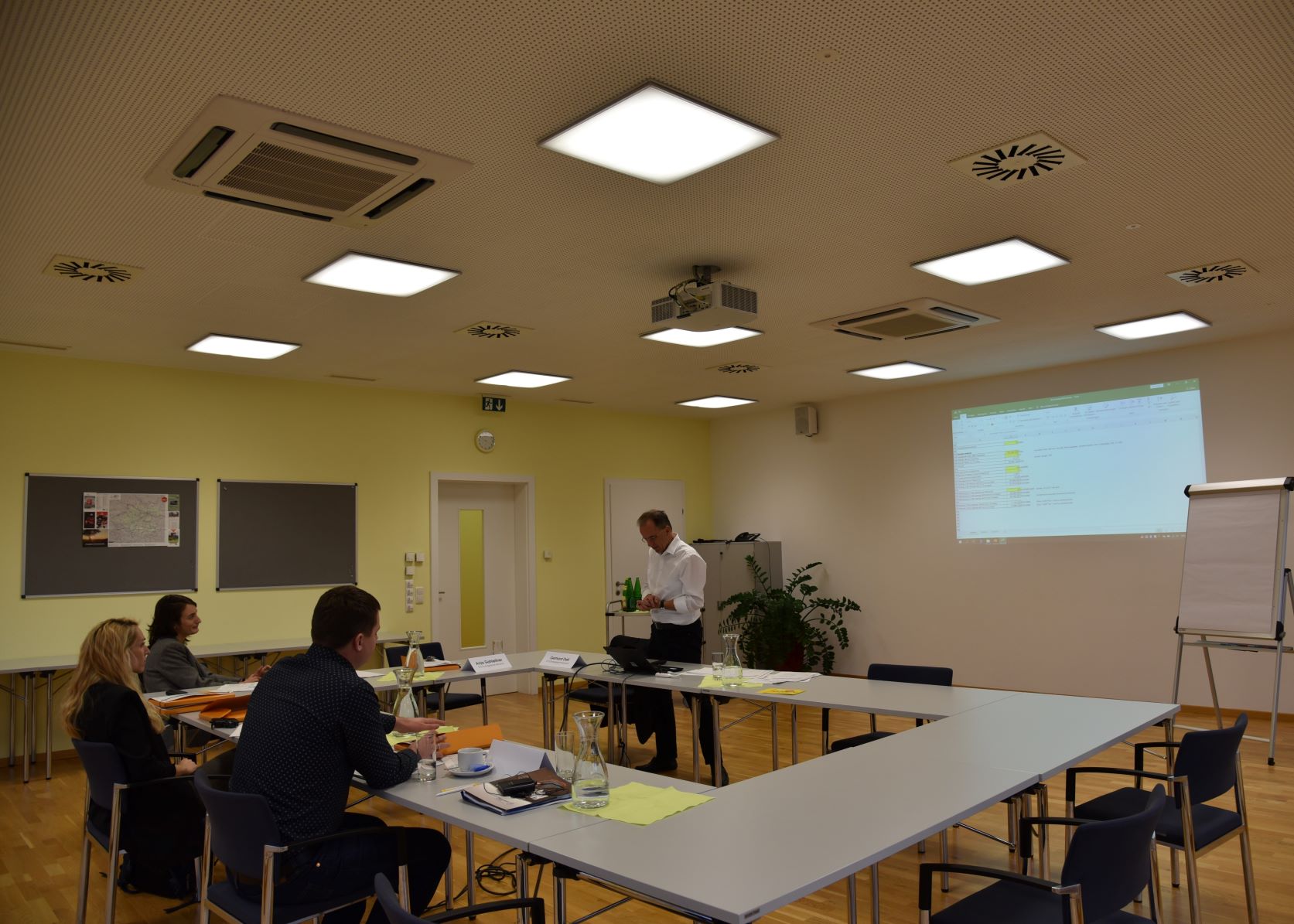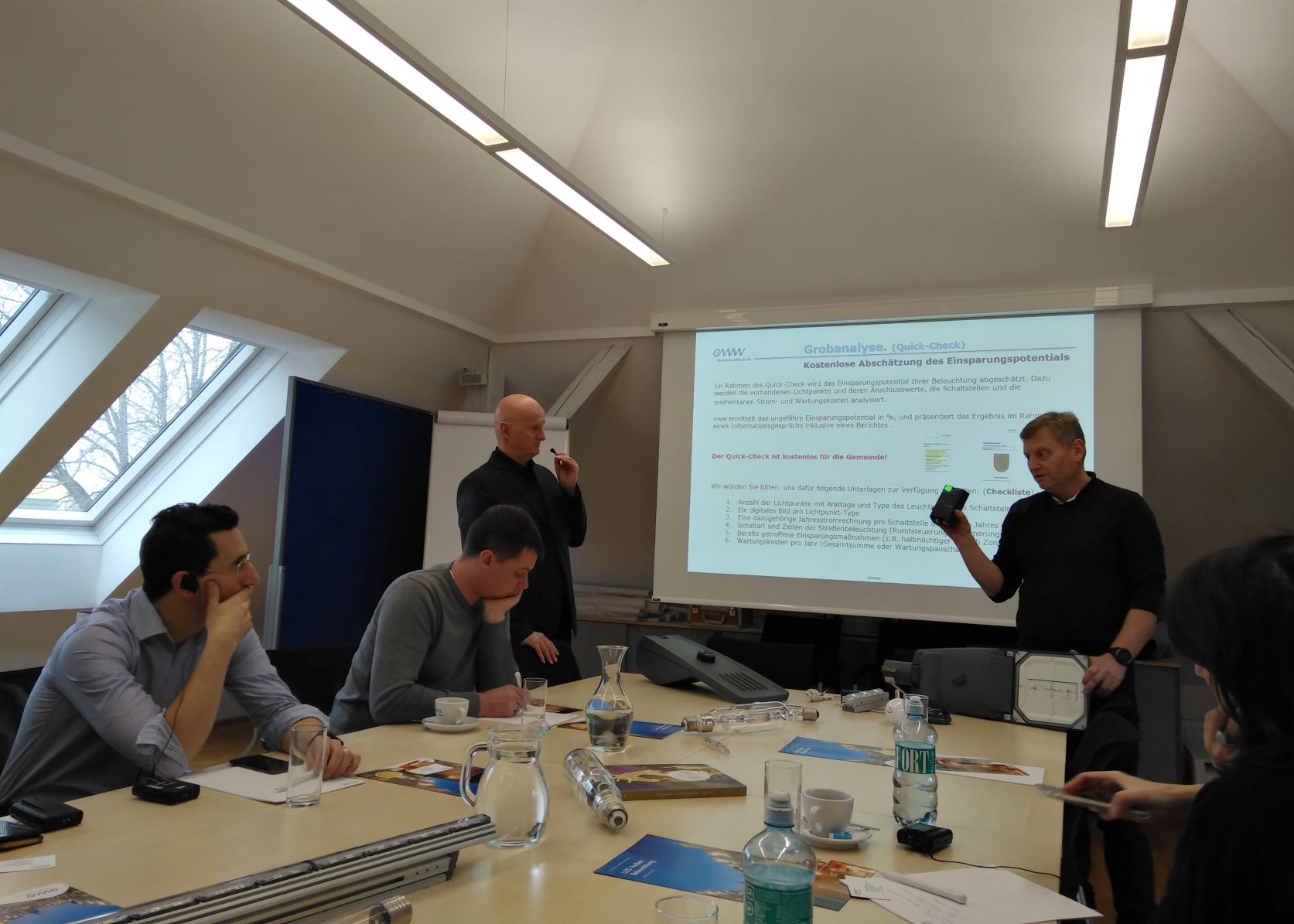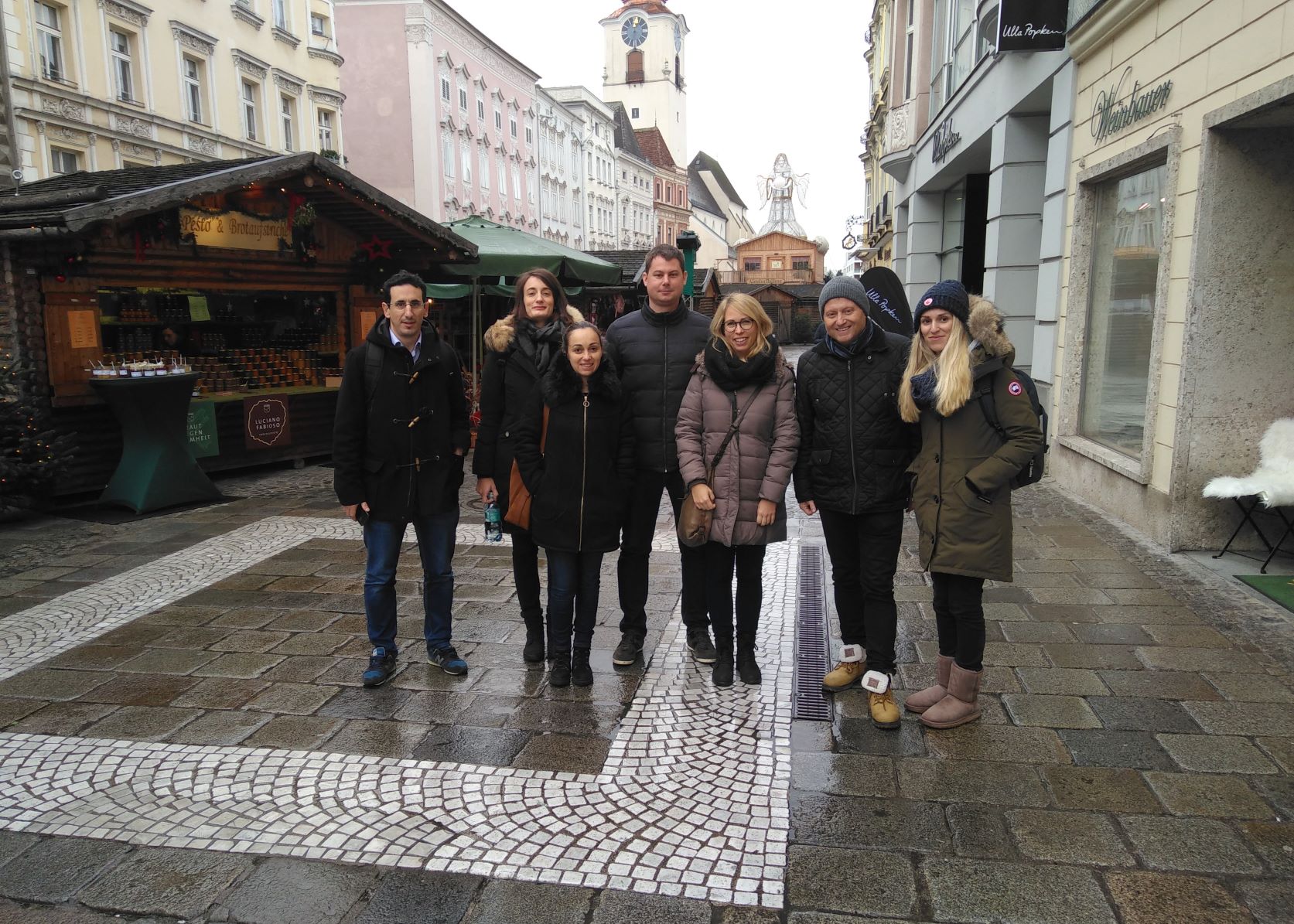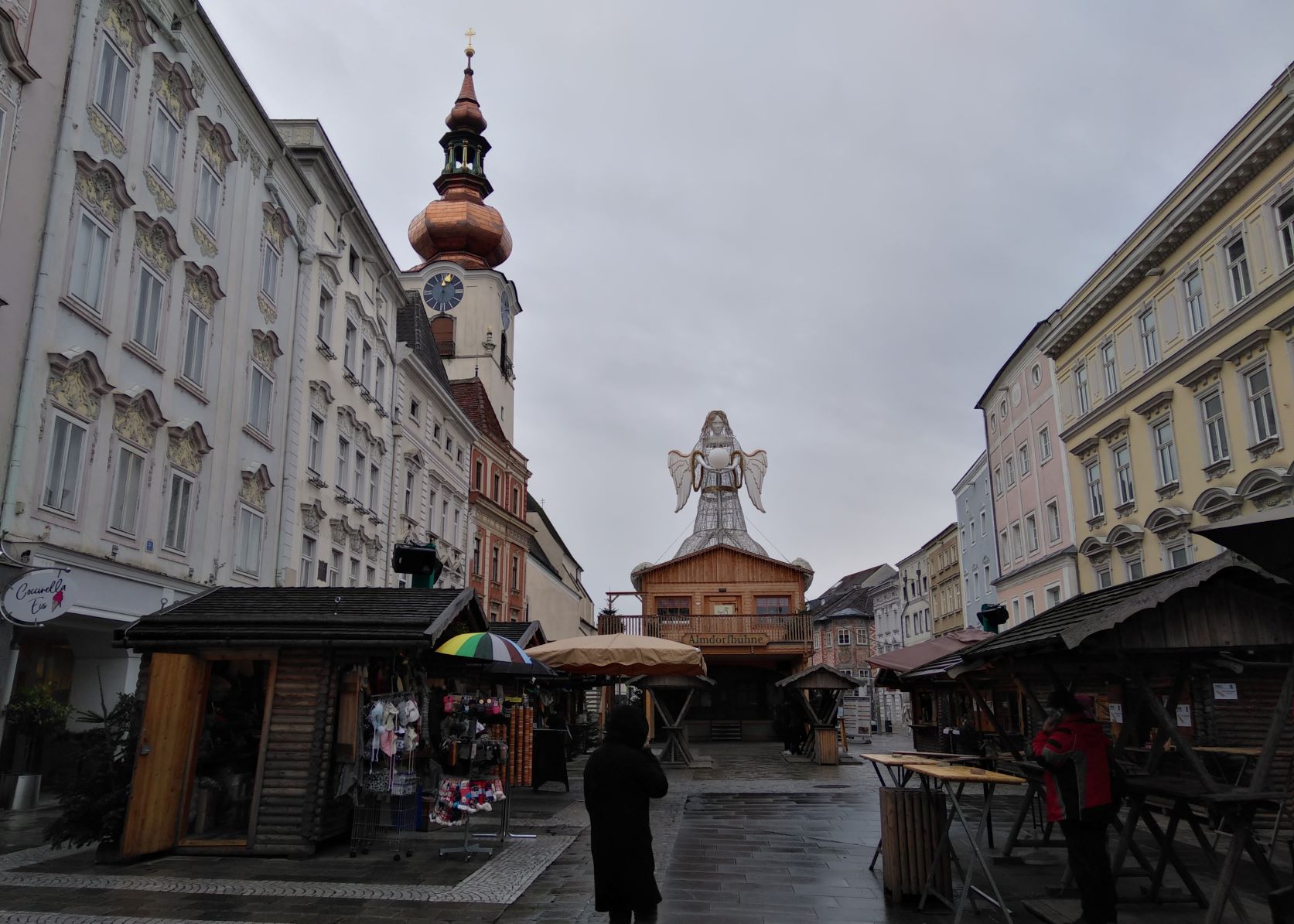OÖ Energiesparverband (ESV) mentoring in PROSPECT Learning Cycle 3
In the context of a four-step learning programme offered by the PROSPECT project, the mentor regional energy agency of Upper Austria (ESV) is sharing its expertise on financing and implementing successful EPC streetlighting projects with the mentees Consip S.p.A (Italy), the Municipality of Kharkiv (Ukraine) and the City of Guimarães (Portugal). This constitutes the 2nd Group for Public Lighting. The peer learning activities are focused on Energy Performance Contracting (EPC). +Mentors' Corner
Energy efficiency improvement measures often require significant upfront investments. In many cases, EPC can offer a solution to overcome this obstacle. A well-functioning contracting market can contribute to achieving significant increase in energy efficiency and long-term energy and cost savings. Upper Austria was the first region to implement a dedicated programme to overcome barriers of Energy Contracting market development.
The regional government started its first programme for EPC market development in 1998.
The programme supports energy efficiency projects and investments in renewable energy technologies in the public and business sectors. The key to the programme's success is the combination of a strong supporting facilitation service (information & advice services offered by the regional energy agency) and a financial incentive offered by the regional government.
During the Step 1, on the 25th of June 2019 the team met online. At the meeting, the Mentor representatives presented best practices related to the Learning Group, based on projects, which have already been implemented.
Overall, this has led to a functional and well-developed Energy Performance Contracting (EPC) market in Upper Austria with many EPC projects implemented each year. More than 200 contracting projects were supported (about 100 in municipalities, 50 in companies and 50 in institutions), with a total investment of around 65 million €. For example, in the Municipality of Gunskirchen the following savings were achieved: 78,300 kWh of electricity, 12,500 € of electricity costs, 28,000 € of maintenance costs, as well as a CO2 emission reduction of 36 tons.
During the Step 2 of the Learning Programme on the 18th of July 2019 the team met again online. The Mentees presented projects and ideas related to the role of EPC in public lighting. Specific needs to be addressed during the visit by the mentor were discussed as well. Some of the learning objectives defined during the session were to:
- Understand the innovative financing schemes relevant under public lighting
- Recognize the barriers, incentives, advantages, and disadvantages of the innovative financing schemes and especially EPC
- Examine which sustainable energy and climate action projects can be financed by innovative schemes and mainly by EPC
- Analyze the success factors and lessons learnt from successful projects financed by innovative schemes
- Identify the different steps on how EPC scheme can be developed and/or accessed for a project
- Understand the contract procedures and the documentation needed to apply EPC as financing scheme
- Analyze the monitoring and verification processes of measures when EPC is applied
The Mentees visited the ESV in Austria to learn about best practices for Public Lighting
During Step 3 of the Learning Programme, a two-day site visit was organised on the 27th and the 28th of November 2019, in Upper Austria. The regional energy agency of Upper Austria (ESV) shared its expertise on financing and implementing successful EPC streetlighting projects (Municipality of Bad Schallerbach, Municipality of Gunskirchen, Large-scale conversion to LED in Wels, Gas station "Pink" with the Consip S.p.A (Italy), the Municipality of Kharkiv (Ukraine) and the City of Guimarães (Ukraine).
The main objective was to deepen the mentees’ know-how of EPC-related topics and to create an environment for dialogue and exchange on details of the practical implementation of streetlighting refurbishment projects and EPC. The programme focussed on LED streetlighting technology, EPC and funding issues through presentations, the calculation of concrete examples and site visits.
Prior to the site visit, the mentees sent key data on their "candidate" projects. Based on this data, ESV conducted an initial feasibility analysis of the project’s economic viability. The results were presented and discussed during the meeting. This permitted partners to transpose the theoretical information they were receiving into the context of their respective regions. Each participant went home with realistic numbers and valuable information about their potential project. This information can be communicated to municipalities and regional leaders to help increase interest in streetlight refurbishment with EPC
On the second day, one of Upper Austria’s major ESCOs held a detailed presentation about the steps to implement a streetlighting project with EPC, offering partners insight into the world of ESCOs. This session was also complemented by a site visit. First of all, the group visited the "Light Demonstraton Street" in Wels, where various lighting technologies and LED luminaires have been set up by the city’s electricity utility (which is also active as ESCO). This was followed by a visit of 2 streetlighting refurbishment projects implemented using EPC (in the City of Wels and the Municipality of Lichtenberg)
 Mentees learning from Esv in Upper Austria (a)
Mentees learning from Esv in Upper Austria (a)
 Mentees learning from Esv in Upper Austria (b)
Mentees learning from Esv in Upper Austria (b)
 Mentees learning from Esv in Upper Austria (c)
Mentees learning from Esv in Upper Austria (c)
 Mentees learning from Esv in Upper Austria (d)
Mentees learning from Esv in Upper Austria (d)
~
“The event was very well structured and varied with a theoretical part and a practical part. The early transmission of the teaching materials was very helpful, and the teaching contents were well structured and clearly understandable, especially for participants with no technical knowledge. Also, the site visits were very important in order to deepen the theoretical knowledge acquired before. The translation support provided by a professional interpreter proved to be extremely valuable. Finally, what I liked most was the practical part, particularly the knowledge exchange with experts from Austrian companies and municipalities.”
Martin Messner from the Municipality of Kharkiv (Ukraine)
“The entire learning program was very complete and exhaustive, in each part it was composed. The exchange of initial information led to the identification of significant contents and field of work, while the meeting in Linz was structured in such a way as to exploit the previous information both on a theoretical and practical basis. From a theoretical point of view, in fact, all the essential contents for the classification of this type of contract have been provided, while the practical application with the visit of both the ESCO and the experienced municipalities have made the content of great value. I consider it an experience of great professional value but also human, for the group work we have been called to carry outnal interpreter proved to be extremely valuable. Finally, what I liked most was the practical part, particularly the knowledge exchange with experts from Austrian companies and municipalities.”
Cristina Gironi from Consip S.p.A (Italy)
“The learning program was very interesting and well organized since the beginning. It was crucial the exchange of initial information and the access to the materials. The modules were clear and well structured. The study visit was very important in order to exchange experiences and ideas among the participants. The program was rich, and it was possible to deepen the knowledge acquired before and the knowledge exchange with experts from Austrian companies and municipalities was very important. We can get in contact and learn with experts who are experience and to know the good practices in the public lighting issue. This was undoubtedly a great asset to our learnings.”
Vera Soares and Rui Pacheco from CIM do Ave, Guimarães (Portugal)
Replication/Transferability
The 4th and last step of the Programme took place on the 19th of December 2019 and included an online session dedicated to the assessment and evaluation of the peer learning activities.
Detailed action plans were submitted by the mentees, in light of the new-acquired knowledge gained from the mentor. Conditions for success and key parameters that could affect negatively the plans were also identified, along with a benchmark survey that encapsulated all the outcomes of the learning group.
Rethinking the financing scheme:
Main impressions and understanding about the financing scheme:
Main impressions and understanding about the financing scheme: ESCO is neither a loan nor a grant, it is a private, profit-oriented company that finances and implements energy saving measures. The ESCO guarantees the energy savings in an EPC contract. The annual cost savings are then used to cover the investment and capital costs. After the end of the contract the client benefits from cost and energy savings. This creates a win-win situation for everyone involved and especially for the municipality, as the risk remains at the ESCO.
The financing scheme allows the municipality to carry out energy efficiency measures without any direct investment, benefiting from the results at the end of the contract
Main impressions and understanding about the financing scheme: Interesting financing instrument for municipalities that have no budget.
Key project implementation drivers:
In many municipalities energy saving potentials through EPC projects reach 30-70 %. On average, an investment in EPC projects pays for itself within 10 years. An ESCO provides the necessary know-how for EPC projects and takes the financial risk. Usually EPC projects implemented through ESCOs neither burden the municipal budget nor require a credit line.
The public administration does not have to allocate funds, while the economic operator amortizes the investment for a number of years that generally allows to largely respect the return margins of the invested capital.
Negotiation of investment value and interest rate and savings for the municipality.
Key project implementation barriers:
- The economic operator must have the economic strength and the technical organization to manage a complex contractual scheme, so it is hard for these activities to be carried out by small single economic operators. The municipality outsources all the activities but must in any case monitor the evolution of the contract, which turns out to be complex, therefore it is necessary the presence of qualified personnel even by the public administration
- If there is variation in the hours of use of the public lighting network, profits may become expenses. In Portugal we have a company that has the concession of the entire public lighting network. We do not pay for maintenance of lamps that are in the concession agreement (there is a list of lamp types
- ESCOs are not feasible in all European countries due to various reasons: Lack of suitable companies, lack of legal bases, unprofitable due to low costs for energy and maintenance. In addition, there is a lack of knowledge of municipal representatives about financing possibilities through EPC projects.
Key steps to set up or develop the financing scheme:
Above all, project preparation is the key to a successful EPC project. It is mandatory to obtain data on consumption, energy and maintenance costs as accurately as possible in advance. If the requirements for a profitable implementation of an EPC project are met, a suitable ESCO can be contacted to calculate and conduct the project
- Investment and interest rate
- Number of years of project development
- Amount to be returned and profit from promoter

